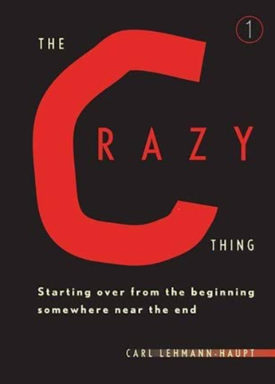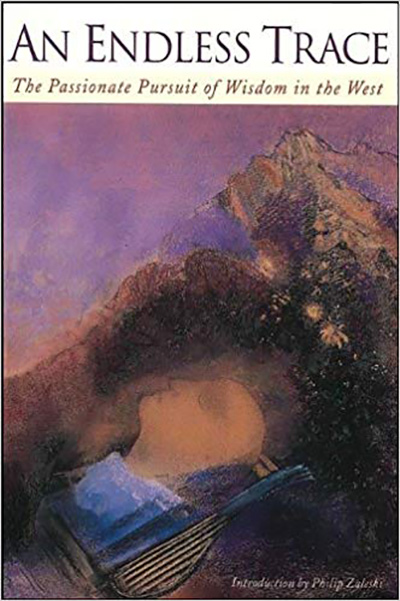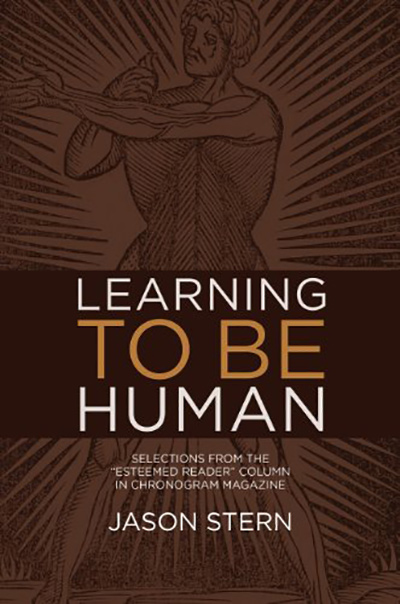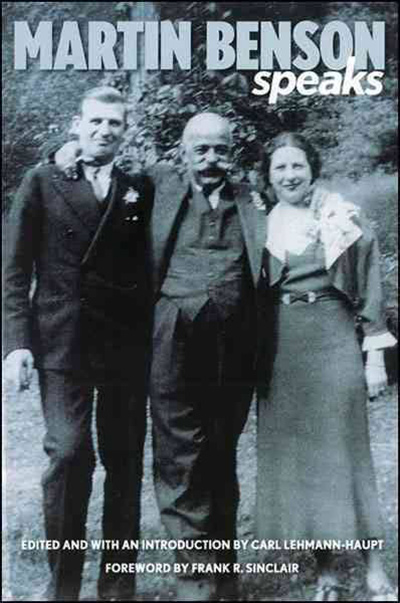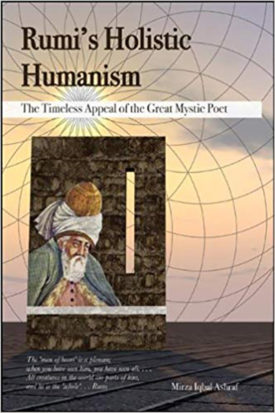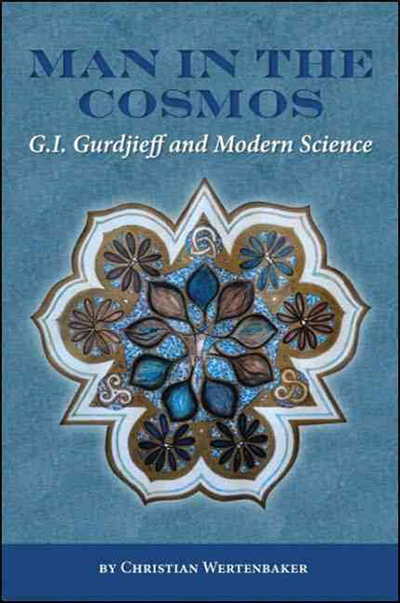-
Out of stockThe Crazy Thing tries to respond to this endless question. It is a love story entwined with a philosophic quest. Beginning from the question about dying it goes on to explore some ways in which it might be possible to begin over again, and perhaps still learn how to live ‘somewhere near the end.’ The Crazy Thing is a memoir with three themes: the story of the author’s long love affair with the poet Celestine Frost; the drama of his enigmatic calling as an artist, writer, and thinker; and his lifelong search for the incalculable limits of the self. The Crazy Thing is a work in progress, whose outcome is yet to be known. This first small volume will be followed by several more. It contains an invitation to the reader to post their questions, comments, and refutations regarding the book’s conclusions on a website — thecrazything.net. The author will take into account the most pertinent of those challenges to his understanding as he composes the subsequent installments. In the end, the book will be a work of collaboration between the author and the community it creates. The Crazy Thing is an artist’s book, composed of drawings, photographs, and fragments of text. The fragments describe events from the author’s past, which alternate with journal entries from the present, in which the old man confronts the younger man he once was. The book is made up of many pieces, but all of them point to one conclusion — the picture of a man in search of his full stature. As for the Crazy Thing itself no one can tell what it is. It is the X-factor that can’t be named because it is not a thing among the things of the world. Nor is it a power. Anyone may feel its inexplicable influence, but they will search in vain for the cause. The Crazy Thing is present only in its absence. Listen carefully and you may hear it sweeping the top of the sky clean.
-
Out of stockThe Passionate Pursuit of Wisdom in the West Two powerful motives weave beneath the surface of our spiritual history: the desire to know and the desire to love. The secret history of the West is the story of saints, mystics, alchemists, poets, and philosophers trying to unite these two streams and celebrate—in the world and in their own persons—the sacred marriage of Logos and Sophia, Word and Wisdom. This book, an impressionistic history of the Western spiritual tradition, follows the traces—from ancient Greece into modern times—of those who sought to know the world and themselves, while realizing that they must overcome themselves to love the world and each other. There are chapters on Pythagoras, Sophia, Celtic Christianity, the Troubadours, the Grail, the Rose Cross, Renaissance spirituality, Romanticism, nineteenth-century occultism, and twentieth-century esotericism. Inspirational interludes place the whole within an atmosphere of Christian mysticism. Tracking this endless trace of our evolving relationship with each other, God, and nature, we begin to understand how human consciousness has changed and evolved and what humanity's task is now. With an introduction by Philip Zaleski, editor of The Best Spiritual Writing Series.
2003 | 303 pages
-
Out of stock"This text must be a mirror. It must reflect the reader back to herself, so that the reader acquires a vision. It requires a power greater than the text to allow the reader to see with clarity. It is the additional matter of awakening the heart. Ultimately, a search is sustained by strong feeling for the adventure of being in light of one's inadequacy to venture forth."
—from the Foreword
A compilation of Stern’s columns from Chronogram in which he explores the intriguing concept of regional culture in its full meaning. Learning to be Human is a book about striving. The chapters are culled from a regular column in the Hudson Valley’s Chronogram magazine, over a thirteen year span. It is an inner account of a search for meaning in the light of the teachings of G. I. Gurdjieff, as well as Sufism, Buddhism, Taoism, and Judaism, in the context of the life of a seeker, lover, father, householder, athlete, publisher, and entrepreneur. The essays are a record of insights and experiences gleaned in light of a fundamental admonition: Know Thyself. What makes the book unique is its consistent return to the teachings of G. I. Gurdjieff as a key to unlocking not only the meaning of the world’s great traditions, but also the experiences of the life of a man in the world, spanning the ages of 25 to 40 years old. The style of writing varies from deeply personal, almost confessional, first-person narratives, to poetic observations, to pedagogic expositions of philosophical and religious ideas. There is a clear political point of view, but always tempered by an emphasis on self-knowledge and the reflection of the activities of people in the world in ourselves. Jason Stern is the publisher and co-founder of Chronogram. Jason Stern's meditative but acute reflections on current issues and community events seem to echo the insights of Emerson and Thoreau, viewing the cosmos through the details of current life, looking with humour on the vagaries of our minds and customs. His centering in the ideas of Gurdjieff, the Armenian Greek who startled people a hundred years ago now by his cutting insight into human folly, gives Jason an edge that puts him in a special category. But here is no jargon or harsh judgment. Here is a human voice, sparkling with warmth and softened in bemusement, a voice-over to the movie of human life he sees just outside his window. You can dip in almost anywhere and find yourself smiling, no matter how serious the topic. Such a compassionate observer is surely a reminder of our own conscience and compassion.—Anthony Blake
2010 | 270 pages
-
Jack of all trades, seaman, and spiritual seeker, Martin Benson was gatekeeper for G.I. Gurdjieff at Fountainbleau. He shares intimacies of his life in these captivating memoirs.
2011 | 260 pages
-
Rumi’s Holistic Humanism: The Timeless Appeal of the Great Mystic Poet, presents the mystical poet's passionate conviction that "love is the strongest unifying force," and that its force is present everywhere and in everything. It may even encourage some to study the extraordinary work of Rumi that so often opens the heart of its adepts. For Rumi peace is the natural quest for a "whole person," and the human being's inclination to it arises from a natural universal order. In humankind's fight to root out conflict, violence and war, Rumi's holistic view of unconditional love may prove one of our best friends. Rumi's holistic approach to the phenomena of humankind is that the perimeters between the self and the universe are mitigated to the extent that the material body becomes indistinct of its typical cultural identity. After so many centuries, Rumi today is as he was yesterday, a living icon of Unity and Love for the whole of mankind. Ashraf's holistic weaving of the many spiritual, philosophical, rational, scientific, and cultural "threads" that converge in Rumi's thought offers the beginning of a unitive language that humanists, rationalists, theists, non-theists, atheists, religious folks, artists, scientists—all thinkers of good will from all cultures may welcome and embrace—as they explore and try to understand the universe. So doing, though taking different roads, they unearth a new level of communication and productive diversity. Rumi's Holistic Humanism takes into account the wide range of philosophical inquiry and mystical experiences, issues of psychology, morality and discipline, and the problematic conditions of ordinary daily human existence. Shakespeare gave us the question, "To be or not to be..."Rumi asked"... to love or not to love?", and the WHOLE HEART answers with a resounding YES! "Gamble everything for love."
2012 | 180 pages
-
This book is a collection of essays that try to relate two distinct areas of human knowledge: the mystical cosmology of G.I. Gurdjieff, based on ancient wisdom, and the discoveries and theories of modern science. Christian Wertenbaker, M.D. bases this study on three basic convictions: First, given the lucidity of G.I. Gurdjieff’s descriptions of the human condition, it is necessary to give credence to his ideas about the universe, man, and about their relationship. Second, that the method of modern science is a valid way to arrive at truths about the world, with one caveat: because science tries to be objective and to bracket the subjectivity of the observer, its findings apply only to the external world, leaving the inner world of consciousness to another realm of inquiry. Third, that there is nevertheless only one world, and so all truths about it must be compatible and related. These principles have guided these essays, some of which have been published in Parabola magazine over the last fifteen years. They represent a personal quest for a more comprehensive truth about the nature of reality. To reconcile Gurdjieff’s ideas and modern science, Dr. Wertenbaker went to medical school and to postgraduate training in neurophysiology, neurology, neuro-ophthalmology and ophthalmology. He also became a member of the Gurdjieff Foundation, devoted to exploring Gurdjieff’s ideas.
2012 | 200 pages


